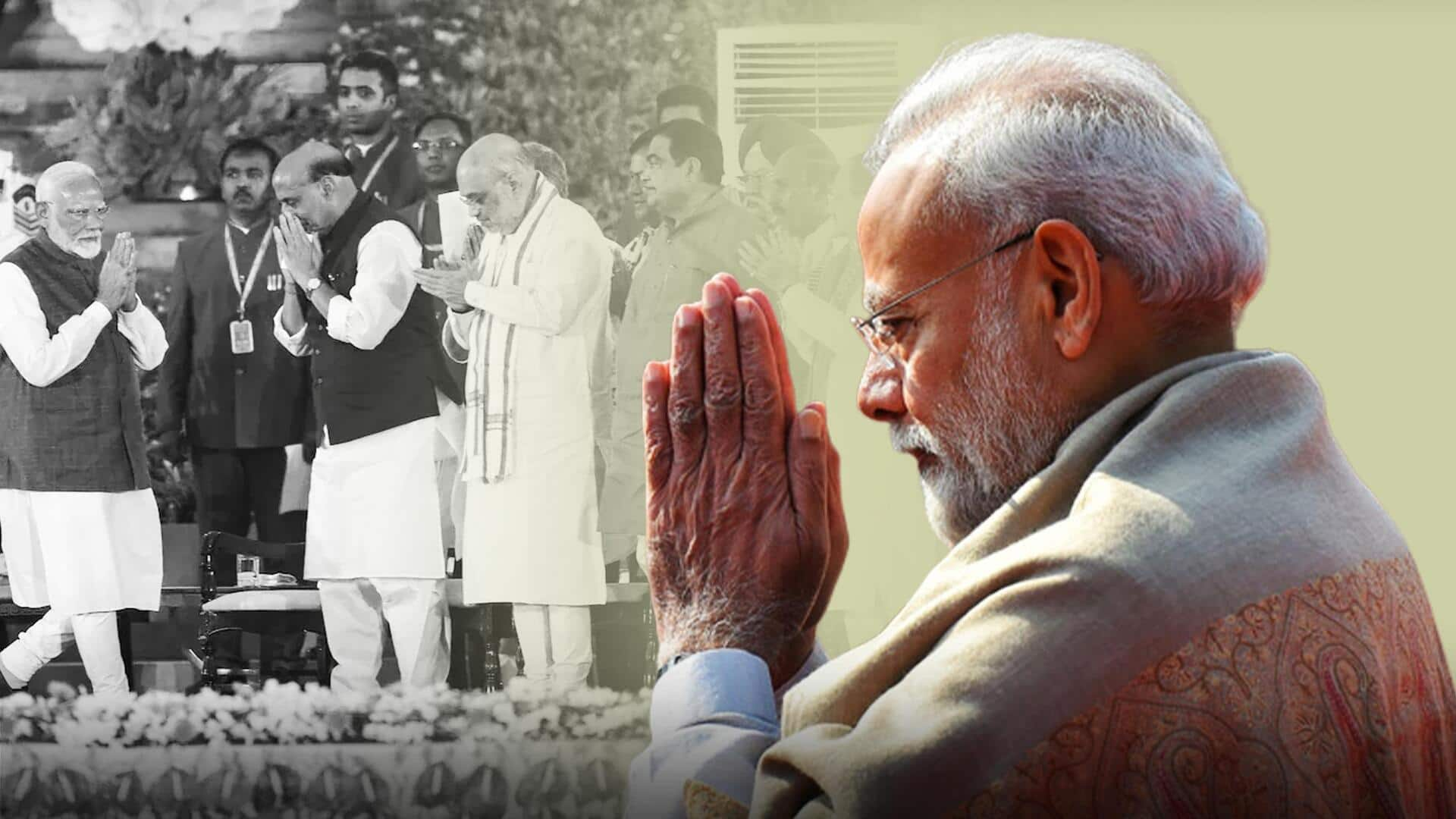
Modi Cabinet 3.0: No change in Big 4; key takeaways
What's the story
Prime Minister Narendra Modi has assigned portfolios to the Cabinet colleagues of his new National Democratic Alliance government, maintaining continuity in the big four ministries. Amit Shah continues as home minister, Rajnath Singh retains defense, Nirmala Sitharaman stays with finance, and S Jaishankar remains in charge of the external affairs. Additionally, Nitin Gadkari has been reappointed as the minister of road transport and highways. Here are the key takeaways from the Cabinet portfolio allocation:
Context
Why does this story matter?
On Sunday, Modi was sworn in as prime minister for the third time, matching Jawaharlal Nehru's record of three consecutive terms in office. His latest cabinet, comprising 71 members, is larger than his previous two. According to reports, the Telugu Desam Party and the Janata Dal (United)—with 28 MPs between them—did not push much for their "demands," contrary to speculation after voters denied the Bharatiya Janata Party an outright majority.
CCS composition
Key Cabinet Committee on Security remains unchanged
The composition of the Cabinet Committee on Security (CCS) remains unchanged with Singh, Shah, Sitharaman, and Jaishankar retaining their positions. New faces such as BJP leaders JP Nadda, Shivraj Singh Chouhan and Manohar Lal Khattar have been inducted into the cabinet. Nadda will handle health, as he did in Modi 1.0; Chouhan has been appointed minister for agriculture while Khattar is now minister of housing and urban affairs and minister of power.
Portfolio reassignment
Portfolio changes for several ministers in Modi's Cabinet
Several ministers including Mansukh Mandaviya, Pralhad Joshi, Jyotiraditya Scindia, and Kiren Rijiju have seen changes in their portfolios. Mandaviya has been assigned to the Ministry of Labor and Employment along with the Ministry of Youth Affairs and Sports. Joshi is now overseeing Consumer Affairs, Food and Public Distribution, and New and Renewable Energy. Scindia has been given charge of Communications and Development of the North Eastern Region. Rijiju is now Union Minister of Parliamentary Affairs and Minister of Minority Affairs.
PM's Portfolios
Prime Minister Modi retains key portfolios
Meanwhile, PM MOdi will oversee the Ministry of Personnel, Public Grievances and Pensions, the Department of Atomic Energy and the Department of Space. He is also in charge of portfolios not allocated to any minister. Other ministers retaining their roles include, Sarbananda Sonowal overseeing Ports, Shipping and Waterways, Bhupendra Yadav handling Environment, Forest and Climate Change, while Ashwini Vaishnaw continues as Minister of Railways and Electronics and Information Technology with an additional portfolio of Information and Broadcasting.
Allies representation
New Cabinet ministers inducted from BJP allies
PM Modi's new Council of Ministers is 71-strong and comprises 11 ministers belonging to NDA partners—the TDP, the JDU, the Shiv Sena, and others. The TDP's Kinjarapu Ram Mohan Naidu and Lok Janshakti Party chief Chirag Paswan have been given the Civil Aviation and Food Processing Industries portfolios respectively. Janata Dal (Secular) leader HD Kumaraswamy, former chief minister of Karnataka, has been entrusted with Heavy Industries and Public Enterprises and Steel ministries.
Additional appointments
Cabinet positions allocated to allies
Further appointments include Hindustani Awam Morcha leader Jitan Ram heading the Ministry of Micro, Small and Medium Enterprises. Separately, JD(U) leader Rajiv Ranjan Singh (Lalan Singh) has been allocated the Ministry of Panchayati Raj and the Ministry of Fisheries, Animal Husbandry and Dairying. Rajya Sabha MP Jayant Chaudhary has been given independent charge of the Ministry of Skill Development and Entrepreneurship.
New entrants
First-Time MPs in Modi 3.0 Cabinet
Among the first-time MPs, BJP's Suresh Gopi has been appointed as Minister of State (MoS) for Petroleum and Natural Gas and MoS for Tourism. Notably, Gopi is the first BJP MP from Kerala. He won from the Thrissur constituency. Ravneet Singh Bittu has been assigned the roles of MoS for Food Processing Industries and MoS for Railways.